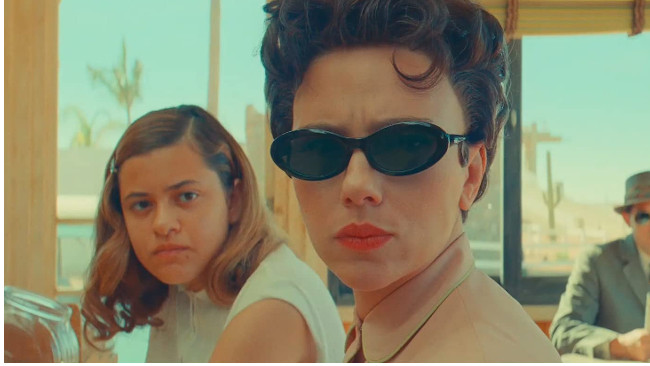‘Asteroid City’ Delivers Wit and Charm but Nothing New

Wes Anderson has been making Wes Anderson movies for a long time now and some might say he’s the best at it. While it does seem like his movies are built on top of the same skeletal structure, they also manage to have a certain charm, thanks to their dialogue style and quirky, yet often subdued, characters. “Asteroid City” is another entry into Anderson’s growing catalogue and it’s a film that can feel like the result of drawing with a stencil or baking with cookie-cutters and it’s hard to tell how much of that is intentional or just the filmmaker doing what he always does.
The framing device for this movie is that “Asteroid City” is a play taking place in a desert town of the same name. A convention is being held there that’s the equivalent of a school science fair where young geniuses bring their creations to be judged by government officials. The whole 1950s aesthetic works well and the bright colors of clothes and cars clashing with the desert backdrop create an interesting visual identity. The meta storytelling eventually pays off, but for the first two acts of the film, the cuts back to Bryan Cranston as the host and other cutaway scenes are too much of a diversion for their own good. Generally, there are a few scenes that seem like they’re just there so that Anderson can indulge in his trademark whimsy, yet the routine is often lacking in the clever humor that makes it work in the film's better scenes.

While the entire cast does a good job, Scarlett Johansson and Jason Schwartzman stand out above the rest. Their subdued yet troubled characters are the main source of humor throughout the film and while their romance doesn’t exactly hit its mark, they still have good chemistry. The biggest problem with the characters is that Anderson doesn’t write them in a way that feels fresh. That’s not to say that their dialogue is predictable because it can be pretty random, but rather they all appear like the stereotypical characters that one would expect from a Wes Anderson movie.
While the film deals with themes of grief, government suppression, and love, it’s the theme of moving on that is most interesting. The freight train that moves through town does a good job of symbolizing the sometimes grim reality of life. You move forward, pick up baggage along the way, and even though there are moments that make you wish you could stop time, you have to keep going. Through death and uncertainty and even amidst chaos and unexplainable events, our only real option is to keep going and most of us do so while only capable of hoping for the best.

“Asteroid City” is not Wes Anderson’s best or worst movie. It’s not the beginning of a new chapter in his filmmaking, nor is it the end of an era. It’s another classic Anderson film, which is probably what his fans want, even if it might not win over those who may have unfortunately written him off already.
Author Bio:
Ulises Duenas is a senior writer at Highbrow Magazine.
For Highbrow Magazine































































































































































































































































































































